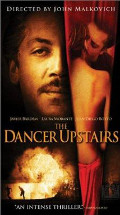
Directed by
John Malkovich
133 minutes
Rated MA
Reviewed by
Bernard Hemingway

The Dancer Upstairs
Synopsis: In an unnamed Latin American nation a terrorist organization tries to foment a popular revolution. Agustin Rejas (Javier Bardem), an idealistic policeman, is given the job of hunting down their leader. In the midst of his lonely undercover efforts he strikes up a relationship with Yolanda (Laura Morante), his daughter’s ballet teacher, who appears to be a respite from the maelstrom into which he is being drawn.A lot of people will go to this because Malkovich directed. I did. Perhaps a tad disappointingly, there is no equivalence to the director’s onscreen persona, nothing distinctively auteurial or even idiosyncratic about it, bar, and this seems to reflect Malkovich’s acting career, an uneasy mixture of independent and mainstream film values.
The Dancer Upstairs is a political thriller made for an informed audience. There are (somewhat laboured) references to Costas-Gavras’s 1973 State of Seige which, like this film, had as its subject matter the activities of a guerrilla revolutionary group in an unnamed South American military dictatorship. Yet, where that film, an international art house success in its time (Costas-Gavras returned to similar subject matter and greater mainstream success with Missing, 1982), had contemporary relevance, Dancer does not. It seeks its raison d’etre in romantic dalliance. Like the principal character, Rejas, it is none too successful in that endeavour.
Rejas is a man caught between two worlds (and perhaps in this respect can be read as a stand-in for Malkovich). That’s fine, but the problem here is that the conflict appears entirely circumstantial rather than moral or emotional. Rejas’s character is established early on as a decent fellow, one who quit the Law (under the right-wing government, one presumes) to find a more honest way of living. He throws up a potentially cosy career to be a border guard. He is unimpeachably thoughtful, even-tempered and kind. Perhaps we can accept his bimbo of a wife as an error of youthful judgement but why, when we catch up with him some years later, is he working as an undercover agent for his former right-wing bosses? It would give too much of the plot away to pursue this further so let it be said that there is no way of accounting for this disjunction or dissociation in the character, or Bardem’s portrayal of it.
In terms of the plot, the point of making Rejas the sensitive new age apparatchik is that he will be attracted by, and attractive to, the chronically sensitive ballet teacher, for this is the cross-current that broadens the film’s appeal. But the instigation of this romance is similarly woolly. It starts with no apparent spark and then just continues in a strangely abstract, almost neurotic, mode until…well, once again, the plot prevents me from continuing.
Given that the script by Nicholas Shakespeare is based on his own book of the same name it is difficult to understand how these flaws came to be so apparent on screen, as presumably they are not in the original text. Whether Shakespeare lost control of his character, Bardem brought it to the role, or Malkovich was overly restrained in his directorial debut, who knows? But this needed some fire from somewhere to really bring it alive. And yet, despite its faults (and they at least will give you something to discuss), it is a solid effort. Javier Bardem, always a compelling screen presence, is drop-dead gorgeous (his suits are way too well-cut for a supposedly lowly-paid cop), the plot is engaging, the pace suspenseful and the production of high standard. Orson Welles this is not, but it will give you a good night out at the movies.

Want more about this film?


Want something different?




